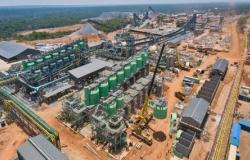The recovery in private sector activity lost significant steam in the euro zone in June, with manufacturing activity recording its sharpest decline in six months, according to the Flash PMI index published Friday by S&P Global.
ATS
The index, calculated based on business surveys, slipped to 50.8, its lowest level in three months, from 52.2 in May. Activity continues to progress, for the fourth consecutive month, but at a significantly slower pace: a figure above 50 signals growth in activity, while a figure below reflects a contraction.
“France’s poor performance has strongly contributed to the decline in the euro zone PMI index,” against a backdrop of political crisis, observes Cyrus de la Rubia, economist for Hamburg Commercial Bank (HCOB), partner of S&P Global.
The results of the European elections and the surprise dissolution of the National Assembly have “very likely caused serious concerns among companies regarding the economic policies of the next government and pushed many of them to suspend their orders and investments” in France, he analyzes.
Sudden decline for the manufacturing sector
Across the euro zone, the index measuring manufacturing production more precisely fell sharply, to 46, compared to 49.3 in May, reflecting a sudden worsening of the decline in activity, against a backdrop of an accelerated decline in new orders – which augurs a prolonged gloomy economic situation.
“Sales prices, which have continued to decline over the last fourteen months, could start to rise again, with manufacturers’ costs having increased for the first time since February 2023”, but generally, “the inflation of prices paid in the private sector displays its lowest level since December 2023,” also notes Mr. de la Rubia.
The moderation of inflation in services has increased, “but prices in this sector remain well above their long-term average, and the index has even started to rise again in Germany, enough to reinforce the idea that the European Central Bank (ECB) will take a break in July” in its interest rate cuts, estimates Franziska Palmas of Capital Economics.
In June, growth in the euro zone is still based on the services sector, where activity remains robust despite a slowdown (index at 52.6, compared to 53.2 in May). A sign of continued gloom, business confidence in the euro zone fell to its lowest level since February.
The euro zone emerged from recession in the first quarter, with an increase of 0.3% quarter-on-quarter in the GDP of the 20 countries sharing the single currency. And this despite very weakened performances in Germany and France, and against a backdrop of lackluster global demand. Economic growth should remain moderate: the European Commission expects GDP to increase by 0.8% over the whole of 2024 in the euro zone, then 1.4% next year.
afp






